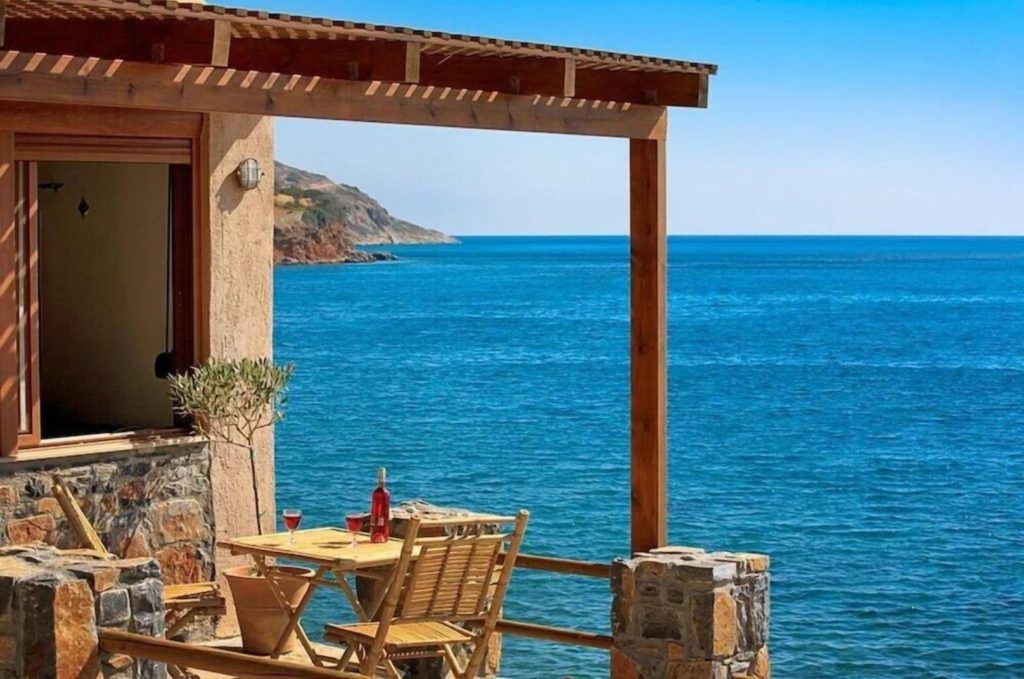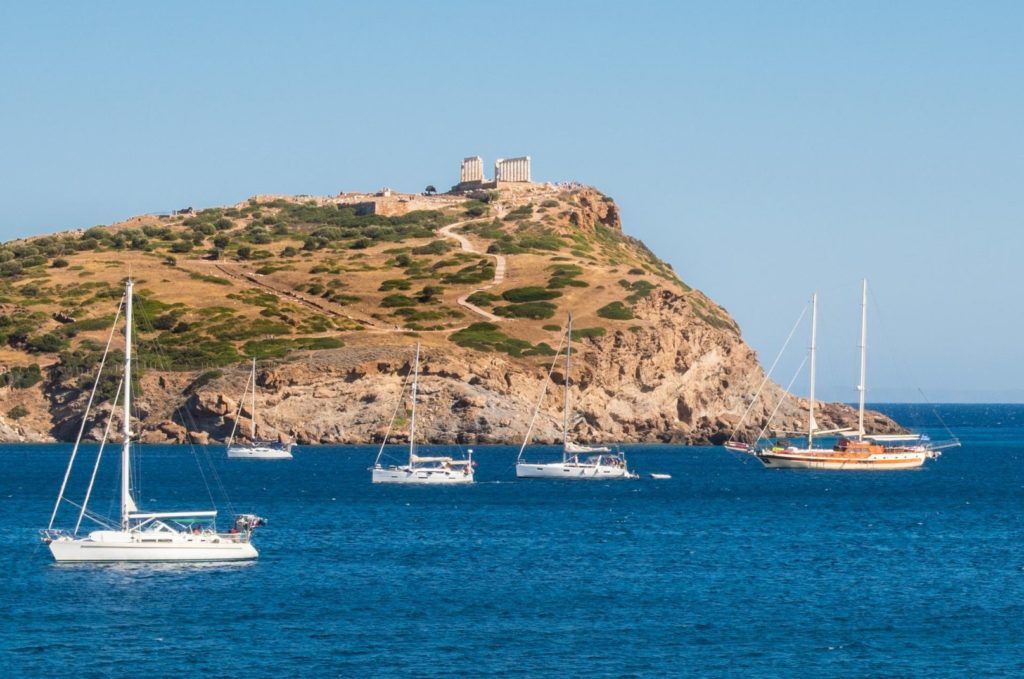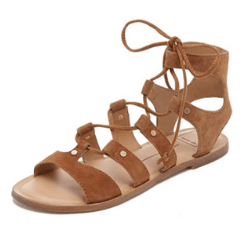Greece is known for its ancient ruins, islands, and museums. But it’s also a premier destination for hiking, medieval monasteries, and the arts. Whatever kind of adventure you want to have here, this Greece vacation planning guide has everything you need for an epic trip!
Greece
I would highly recommend doing some of these Best Day Trips From Athens, visiting some of the lesser-known islands, and spending a few days in the Northern or Western part of the country.
Ready to plan your trip? Here’s the ultimate Greece vacation planning guide!

Top Places to Visit in Greece

Typical Costs When Traveling
Exchange Rate
The currency in Greece is the Euro. Exchange rates are subject to fluctuations, so be sure to check this as your trip approaches. On average, €1 is equal to about £.87 British Pounds, $1.10 U.S. and 7.8 Chinese Yuan.
Accommodation
A hostel room is in the €20-40 a night range (£17.50-34.75, $22-44, 156-313 Yuan). A budget hotel is in the €40–60 a night range (£34.75-52, $44-66, 310-465 Yuan). A mid-range hotel will likely be between €60–150 a night (£52-130.50, $66-166, 465-1162 Yuan). More luxury accommodations start at €150 a night (£130.50, $166, 1162 Yuan) and go up from there. Airbnb prices average around €55 a night (£48, $61, 426 Yuan).
During the summer months, the islands of Santorini and Mykonos will have higher accommodation costs than the average for the rest of the country. So be prepared to spend more on the popular islands from the end of April through August.
Incredible Vacation Homes in Greece
Food
Meals from markets or street stalls are relatively cheap, around €5 (£4.25, $5.50, 39 Yuan). A hearty meal at a local taverna is around €15 (£13, $16.50, 117 Yuan). A meal at a gourmet restaurant will be between €20-40 (£17.50-34.75, $22-44, 157-314 Yuan). And if Michelin stars dining is your preference, plan for meals to start at €60 (£52, $66.50, 465 Yuan) and go up to hundreds of dollars per dish.
Plan to spend around €5 on wine and beer (£4.25, $5.50, 39 Yuan) and €10 on cocktails (£8.75, $11, 77.50).
If you only had meals from markets, you could eat for about €15 a day (£13, $16.50, 117). But while this will keep you fed, you’ll miss out on the fantastic food culture of Greece. So I’d recommend allowing yourself at least a couple of sit-down meals to experience authentic Greek cuisine.
Transportation
Athens has a great underground metro system. The fare is €1,40 (£1.20, $1.50, 11 Yuan) per ticket that’s valid for 70 minutes. There’s also a €4 ticket (£3.50, $4.40, 31 Yuan) that’s valid for all transportation within the city limits for 24 hours.
There are only two main national train lines – from Athens to Alexandroupoli via Thessaloniki and from Athens to Patra. Train tickets average about €40 (£35, $44, 310 Yuan) one-way for seats in second-class.
Buses are the most convenient public transportation option for seeing the country. Greece’s bus network runs through every town, city, and most of the smaller villages, and tickets average about €4 (£3.50, $4.40, 31 Yuan) per 100 kilometers.
Greece has an extensive ferry network that runs to and from the mainland and islands. Ferry services are frequent from March until October, but the rest of the year ferry services are limited. Ferry tickets start around €30 (£26, $33, 233 Yuan) depending on the island you’re visiting and the seat-class you want.
Car Transportation
Renting a car will start around €20 a day (£17.50, $22, 155 Yuan), and then you’ll need to pay tips, tolls, and gas. If you rent a car, you can use ferries to island-hop, but some islands don’t allow cars.
Taxi fares within city limits are relatively reasonable, averaging a €3,50 (£3, $3.90, 27 Yuan) base fee and €1,25 (£1.10, $1.40, 9.70 Yuan) per kilometer. All but the smallest islands have taxi services, though most islands have a few towns that are pedestrian-traffic only.
UberTaxi is available in Athens, which means you can use the Uber app to order a regular taxi. Lyft doesn’t operate in Greece.
Other Expenses
I’d budget around €60 a day (£52, $26, 182 Yuan) for entrance fees, tours, guides, snacks, tips, and souvenirs.
ATMs are widely available in large and mid-size cities and islands. When visiting smaller towns and islands, I’d recommend already having cash-on-hand. In cities and the more popular islands, Visa and MasterCard debit and credit cards are accepted, but in smaller towns and islands, you’ll want to have cash.

Tipping
A 10% tip is standard in restaurants. At hotels, it’s usual to tip bellhops €1-3. For a taxi, you should round up the fare. You should tip around €5 per person (£4.25, $5.50, 39 Yuan) for group tour and museum guides and €20 (£18, $22, 155 Yuan) per person for private tours.
Suggested Daily Costs
These budget estimates include eating and drinking out at least once a day and a couple of train, bus, or ferry rides.
Lower End: €100 a day (£87, $111, 775 Yuan). Midrange: €150 a day (£130, $166, 1162 Yuan). Higher End: €200 a day and up (£174, $221, 1549 Yuan).
Money Saving Tips
How to Prepare for Greece
Vaccinations
The Centers for Disease Control and Prevention (CDC) and World Health Organization (WHO) recommend the following vaccinations: hepatitis A, hepatitis B, rabies, meningitis, polio, measles, mumps and rubella (MMR), Tdap (tetanus, diphtheria, and pertussis), chickenpox, shingles, pneumonia, and influenza.
Passport Health has additional information on current vaccinations and diseases in Greece, and I recommend visiting their website for the most up-to-date travel requirements.
Visas
Citizens of the U.S., Canada, Australia, and Great Britain need a valid passport and a return ticket to enter Greece, but they DO NOT need a visa if they’re staying less than 90 days. EU citizens from countries that are part of the Schengen Agreement DO NOT need a visa even if you’re staying more than 90 days.
If you’re a citizen of another country, you’ll need to check your country’s requirements for visiting Greece. The World Travel Guide has more information on Greece’s visa and passport requirements.
iVisa is an incredibly helpful resource for obtaining visas. iVisa makes the usually complicated and confusing process of getting a visa easy by taking care of everything for you. You fill out a simple online application, and then iVisa takes care of everything else.
Etiquette
In restaurants, the service will feel slow because dining is a drawn-out experience. So it’s considered rude to rush waitstaff.
In churches, avoid using a flash and photographing the main altar. Don’t use a tripod at archaeological sites because you’ll to be stopped and designated as a professional photographer, which requires special permissions.
When To Go
Greece’s High Season is from June to August. During these months, everything is open – sights, tours, transportation, etc. But accommodation prices can be double what they are the rest of the year, and tourists and temperatures will be at their highest.
The Shoulder Season from April to May and September to October is considered the best time to visit Greece. Accommodation prices are about 20% lower, and the temperature and tourist numbers are lower. But internal flights and ferries have reduced schedules, and April and October will be quite cold at the beaches.
Some islands close their beaches from October to April, so check on this before finalizing your plans.
The Low Season is from November to March, when accommodation rates can drop by as much as 50%. But many hotels, sights, and restaurants shut down, especially on the islands, ferry schedules are limited, and it will be cold. The mainland usually has snow during these months.
If you want to be lying out on an island beach, you need to go from May-September.
Greece is one of the Best Destinations To Visit In May!
What To Pack
Greece’s summers are hot and dry, and its winters are cold and wet. Even the southernmost islands get cold in the Winter. So, in the Winter, you’ll want warm clothes, even along the Mediterranean.
A raincoat is always a good idea, no matter where or when you’re in Greece. Most of Greece’s streets (in big cities, islands, villages – everywhere!) are cobblestone, so bring practical and comfortable shoes.
In the Fall and Spring, you’ll want a layer for the mornings and evenings. If you’re visiting during the summer, bring light and breathable clothes and your swimsuit. Here’s a detailed list of Greece’s average weather by month and region.
Electrical outlets in Greece are Types C and F. So if you’re from the EU, you won’t need an outlet adaptor. But British, U.S., and other travelers will need an adaptor.
What To Wear
Greeks are very conscientious about their appearance, but the dress here is generally more casual than in Western Europe.
If you’re visiting a religious site, you’ll want to wear pants or a dress or skirt that isn’t too short or tight-fitting. You’ll also want to have a layer to cover your shoulders to be respectful. Some sites, like the Meteora Monasteries, won’t let you enter if you’re not dressed conservatively.
You’ll see locals wearing all kinds of clothing throughout the year, so feel free to wear whatever you want. But comfortable, practical, and interchangeable are always smart choices when packing for an international trip.
Bring your most comfortable shoes! You’ll be walking A LOT, and you’ll continuously be on cobblestone sidewalks or streets.

Have you been to Greece? Comment below with anything you’d add to this Greece vacation planning guide!

Shop My Greece Essentials

Frequently Asked Questions
How do I organize my trip to Greece?
Steps for planning a trip to Greece:
1. Set your budget.
2. Choose your dates.
3. Book your accommodation.
4. Book your plane, train, bus, or ferry tickets.
5. Plan your day-to-day itinerary.
6. Book tours.
7. Reserve a rental car if you’re going to need one.
8. Make sure your passport is valid for at least six months past the end of your Greece trip.
9. Determine if you need any vaccinations.
10. Create a packing list to ensure you have everything you’ll need/want to bring to Greece.
How many days in Greece is enough?
You need at least two days to explore Athens properly, and I’d highly recommend staying here a third day to take a day trip to Cape Sounion, The Meteora Monasteries, or Delphi. Then you need at least three days on each island you want to visit.
How far in advance should I plan a trip to Greece?
You should start planning international trips a year in advance. Once you have your dates set, begin researching flight, accommodation, and rental car prices. You can set price alerts when there are deals, but as a general rule of thumb, the earlier you book, the cheaper the cost will be, especially if you’re traveling in the peak summer months.
You’ll want to make activity reservations about three months in advance to ensure availability.
How much does an average trip to Greece cost?
Expected daily costs (in U.S. dollars) for Greece:
Lower End: $100/day per person.
Midrange: $175/day per person
Higher End: $250+/day per person
How many euros do I need for a week in Greece?
Expected daily costs (in Euros) for a trip to Greece:
Lower End: €100/day per person
Midrange: €150/day per person
Higher End: €200+/day per person
How can I get to Greece cheap?
How to travel to Greece on a budget:
1. Visit in the shoulder or off-seasons.
2. Don’t eat at restaurants near famous landmarks.
3. Do free self-guided walking tours.
4. Stay in hostels.
5. Rent a moped instead of a car.
6. Cook or pack out your meals.
7. Don’t stay in tourist towns (for example, stay in Fira instead of Oia on Santorini).
8. Eat out for lunch instead of dinner.
9. Drink local beer and wine.
10. Book plane tickets, accommodation, rental cars, and tours in advance.
What is the best time to fly to Greece?
Greece’s High Season is from June to August. During these months, everything is open – sights, tours, transportation, etc. But accommodation prices can be double what they are the rest of the year, and tourists and temperatures will be at their highest.
The Shoulder Season from April to May and September to October is considered the best time to visit Greece. Accommodation prices are about 20% lower, and the temperature and tourist numbers are lower. But internal flights and ferries have reduced schedules, and April and October will be quite cold at the beaches.
Some islands close their beaches from October to April, so check on this before finalizing your plans.
The Low Season is from November to March, when accommodation rates can drop by as much as 50%. But many hotels, sights, and restaurants shut down, especially on the islands, ferry schedules are limited, and it will be cold. The mainland usually has snow during these months.
If you want to be lying out on an island beach, you need to go from May-September.
Is Greece a cheap place to visit?
Greece is a relatively inexpensive destination compared to most other Western and Central-European countries.

This Greece vacation planning guide is not a sponsored post, and, as always, the thoughts and opinions expressed in this Greece vacation planning guide are entirely my own. Some of the links in this Greece vacation planning guide are affiliate links, and, at no cost to you, I may earn a small commission.
December 5, 2019
 Destinations
Destinations Packing
Packing Travel Tips
Travel Tips
 Photography
Photography Points & Miles
Points & Miles Credit Cards
Credit Cards































